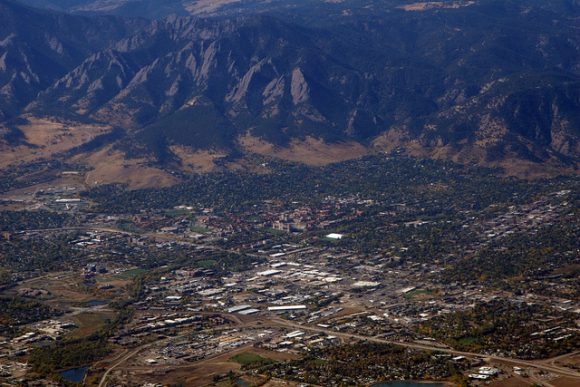
A bird’s-eye view of Boulder. On Wednesday April 25, the sustainability Summit was held to celebrate the sustainability of Boulder and CU and to discuss further improvement. (Doc Searls/Flickr)
Students, faculty and community members alike talked progress and goals during CU Boulder’s 25th annual Campus Sustainability Summit hosted all day Wednesday.
Panel members and attendees praised CU and the city of Boulder for their above-average sustainability efforts and brainstormed goals and future actions. The event was comprised of two expert panels, two workshops, a poster exhibit and a presentation of Sustainability Awards.
The morning panel focused on navigating campus sustainability. Individuals representing sustainability, innovation and student affairs shared goals of renewable energy and minimal waste.
In the Strategy Café that followed, attendees work-shopped prioritizing sustainability goals and uncovering the best methods of encouraging student engagement.
After a presentation of awards, a panel of CU faculty members and city representatives assembled. They explained the relationship between the university and the city, as well as their shared goals.
Mayor Suzanne Jones emphasized that the with the state of national politics, it’s more important than ever for local governments to move towards sustainability.
Given the current administration’s response to environmental issues, Jones said the city of Boulder is working harder than ever to run off of primarily renewable energy.
“It’s really up to local communities to lead on these issues […] to keep our country moving forward,” Jones said.
Jones stressed that the city and the university agree that there is an exceptional need for action on the local level. By binding together, the two entities can accomplish far more.
“The state of this relationship has never been better,” Jones said.
CU’s Vice Chancellor for Infrastructure and Sustainability David Kang agrees. He called CU a pillar in the Boulder community.
Kang stressed that Boulder’s reliance on fossil fuels is not a problem limited to CU, nor is it a city issue.
“We’re not gonna be able to achieve any of our goals if we don’t work together and we’re not aligned,” Kang said.
Brett KenCairn, the environmental planner for the city of Boulder, explained how the university and the city collaborate as well as they do.
He stated that the city identifies its main concerns and prioritizes its goals. As a research university, it is CU’s responsibility to develop solutions. KenCairn said that the only tool for tackling climate change is collaboration.
He stressed the importance of combining the knowledge, expertise and creativity of multiple entities to create innovative solutions.
In the second and final workshop of the day, participants brainstormed ways to involve students in the community-wide push for sustainability.
Facilitators concluded that the best way to get students excited about sustainability is to engage them with education and incentives. The new university goals focus primarily on transportation, with attendees proposing a focus on alternative transportation.
Many attendees called for incentives when choosing buses and bikes. They also asked to limit parking permits to upperclassmen.
The 25th annual Campus Sustainability Summit was sponsored by CU’s Office of the Provost, Vice Chancellor for Student Affairs, Vice Chancellor for Infrastructure and Sustainability and CUSG Environmental Center.
Contact CU Independent News Staff Writer Georgia Knoles at georgia.knoles@colorado.edu.
